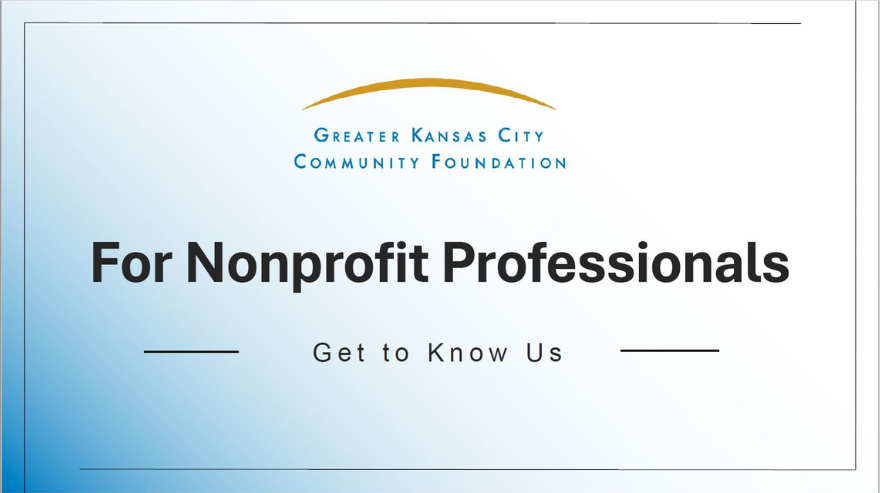
Knowledge Hub
How We Work with Charities and Donors Who Support Them
Most grants from the Community Foundation are driven by our donors, typically through donor-advised funds. Read on to learn more about how the Community Foundation and donor-advised funds work.
FAQs
Donor-Advised Funds
A donor-advised fund, sometimes referred to as a “DAF,” is a charitable giving vehicle sponsored by a public charity, like the Greater Kansas City Community Foundation. In this role, the Community Foundation is considered a “sponsoring organization” or “DAF sponsor.”
A donor-advised fund is set up by individuals, families or organizations (typically for-profit companies), who serve as the fund advisors. The fund advisors (or “donors”) contribute assets to the donor-advised fund and decide which nonprofits they want to support via grants from their funds. The donor-advised fund sponsor receives the contributions, invests the assets, and ensures that grants are made to IRS-qualified 501(c)(3) public charities, including educational, religious and government institutions, following IRS rules.
In most cases, a grant check will arrive in the mail from USPS. Our grant checks include the name of the fund that directed the grant, and we encourage the donor to share their name, email and other contact information on the check stub. It’s rare for donors to choose to grant anonymously, but it does happen occasionally. See a sample grant check.
A grant made from a donor-advised fund is not eligible for a tax deduction. Donations into donor-advised funds are eligible for the maximum tax deduction allowed by law, so donors receive a gift acknowledgment letter from the Community Foundation to retain for their tax records when they make contributions to donor-advised funds. Nonprofits should not send any acknowledgments to the Community Foundation (or any other donor-advised fund-sponsoring organization), but they can send a thank you message directly to the donor.
Grants from donor-advised funds can support any 501(c)(3) public charity in the United States, including governmental, educational and religious institutions. The sponsoring organization will exercise due diligence to make sure grants from donor-advised funds are given to organizations that have met 501(c)(3) IRS requirements. In some cases, the sponsoring organization may need to contact the grant recipient for additional information before approving the grant. See below for more specific information regarding IRS rules for donor-advised fund grants.
Donor-advised fund grants cannot directly support individuals.
Donors may choose to set up a donor-advised fund for several reasons:
- Donor-advised funds provide centralized, simplified record-keeping for all donations.
- A donor may wish to donate a hard-to-value asset, like a privately held business, real estate or bitcoin to multiple nonprofit organizations. Some nonprofit organizations may not have the ability to accept complex assets.
- Assets in donor-advised funds are invested, so donors’ charitable assets can grow, ultimately increasing the amount they can give over time to nonprofit organizations.
- Sponsoring organizations like the Community Foundation can provide strategic counsel to donors and can help develop custom charitable giving plans to help donors address community challenges.
- Donor-advised funds support legacy planning and can engage multiple generations of family members in charitable giving
Individuals, families, companies, foundations and other entities can open donor-advised funds. The Community Foundation primarily works for donors here in Kansas City, but we also serve donors across the country through our national entity, Greater Horizons.
FAQs
Insights from the Community Foundation
If your organization receives a grant from a fund at the Community Foundation, you’ll want to record the name of the fund, which appears at the top of the check, unless the grant was made anonymously. Additionally, the check stub will likely include the donor’s name and contact information (typically email address).
Your organization should record the gift as coming from the specific fund or donor, not the Community Foundation.
You do not need to send an acknowledgement or thank you to the Community Foundation. Instead, we recommend that you send a personal thank you to the donor. As a reminder, the donor is not eligible to receive a tax deduction for the grant, so you should not include your standard charitable tax receipt language.
If you’d like to receive a list of all of the funds at the Community Foundation that have made grants to your organization, please complete our short request form on this page. A member of our team will follow up with a report within a few business days.
The grant history report will include every grant to your nonprofit since 1994. You will also see:
- the purpose of the grant, if the donor designated a specific purpose
- the fund name, unless the donor chose to make an anonymous grant
- the amount of the grant
Feel free to contact our team at grants@growyourgiving.org with any updates you would like to share. Our team aims to stay updated on projects, campaigns and needs in our community to pass along to donors who ask us for guidance. Our philanthropic advisors and grantmaking services teams gather to discuss updates they receive at a monthly nonprofit review meeting.
A donor-advised fund is an additional bucket from which donors can give. Connect with these donors the same way you are already cultivating your current and potential donors.
If you would like a report showing the grants your organization has received from Community Foundation funds, request it here.
Some of our donors, as well as external funders, look to the Community Foundation for assistance in administering their competitive grants for nonprofit organizations.
Learn more about the Community Foundation’s grant opportunities.
While you’re there, sign up to receive our monthly email with upcoming grant application deadlines.
The Community Foundation’s Nonprofit Search, which is a GuideStar Local Nonprofit Directory, provides in-depth information about 501(c)(3) nonprofit organizations headquartered in the 15-county Kansas City metro area. All information is provided via GuideStar (now known as Candid) based on information generated by the IRS and self-reported by nonprofits.
To update your organization’s profile, visit https://learn.guidestar.org/update-nonprofit-report.
Also consider reviewing your organization’s profiles on Charity Navigator and the Better Business Bureau to ensure your information is up to date.
The Community Foundation cannot help your organization obtain 501(c)(3) status.
If you’re in the Kansas City area, we recommend contacting Nonprofit Connect and the Midwest Center for Nonprofit Leadership at the UMKC Bloch School for resources and visiting the IRS website.
This list is a great starting point for exploring other local funders.
Bank of America Philanthropic Solutions
Ewing Marion Kauffman Foundation
Marion and Henry Bloch Family Foundation
Muriel McBrien Kauffman Foundation
United Way of Greater Kansas City
FAQs
IRS Rules for Donor-Advised Fund Grants
Grants from donor-advised funds may cover the cost of memberships if the nonprofit confirms that the full cost is 100% tax deductible, as outlined in IRS rules.
If the cost is not 100% tax deductible, the donor must waive the more than incidental benefits related to the membership. Here are examples of incidental membership benefits that are permissible in exchange for donor-advised fund grants:
- Low-cost items, such as a newsletter, calendar, key chain or coffee mug
- Free admission to all exhibits
- Discounted or free parking
- Discounts at the gift shop
- Preferred access to special ticketed events where you pay for tickets separately
- Invitations to members-only exhibits
Grants from donor-advised funds may support nonprofit organization’s events. However, the IRS has specific rules surrounding events-related grants from donor-advised funds that are not intuitive. Here are a few things to keep in mind regarding tickets, tables and sponsorships.
The full cost to attend events (both the tax-deductible and non-tax-deductible portion) must be paid from a donor’s personal bank account. Remaining sponsorship costs may be paid by a grant from a donor-advised fund, as long as the donor does not receive more than an incidental benefit in return. Logo or name recognition in event materials is not considered more than an incidental benefit.
Here is an example of what the IRS allows to be paid from a donor-advised fund for an event:
A $5,000 event sponsorship includes a table for 10 with the donor’s name or logo in event materials.
If the lowest ticket price to attend the event is $100, then the donor must pay $1,000 for the table from the donor’s personal bank account ($100 × 10 seats at the table) and a grant from a donor-advised fund can cover the remaining $4,000.
NOTE: If a donor chooses not to accept any benefits associated with a sponsorship, the entire amount may be paid by a grant from a donor-advised fund.
Donor-advised fund grants may support fund-a-need calls for outright donations at charitable events. However, the IRS does not allow raffle tickets or auction items to be paid by grants from donor-advised funds, because the donor cannot receive any personal benefits.
A grant from a donor-advised fund may fulfill a commitment to a 501(c)(3) public charity. However, the Treasury and the IRS prohibit using the term “pledge” on grant checks or related correspondence. Instead, the donor should reference a “donation” or “gift.”
Get to Know Us via Our Latest Webinar
For Nonprofit Professionals: Get to Know the Greater Kansas City Community Foundation
Whether you’re new to the nonprofit community or have been dedicated to the work for years, we want to help you and your colleagues learn about the Community Foundation and our role in Kansas City’s philanthropic ecosystem.

